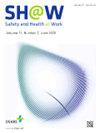社会心理安全气候对日本员工工作需求、工作资源与心理困扰关系的调节作用:一项横断面研究
IF 2.9
3区 医学
Q1 PUBLIC, ENVIRONMENTAL & OCCUPATIONAL HEALTH
引用次数: 0
摘要
背景:本研究考察了社会心理安全气候(PSC)在工作需求(心理需求)和工作资源(工作控制、主管支持、同事支持和外在奖励)与日本员工心理困扰之间的调节(缓冲或放大)作用。方法对在日本一家私人在线调查公司注册的2200名员工(1100名男性和1100名女性)进行网络自我报告问卷调查。问卷内容包括工作需求和工作资源量表(工作内容问卷和简短的努力-回报失衡问卷)、PSC量表(12项PSC量表)和心理困扰量表(K6量表),以及人口统计学和职业特征量表(年龄、性别、教育程度、职业、工作形式、每周工作时间)。以心理困扰为因变量进行分层多元回归分析。包括工作需求和工作资源与PSC的交互作用项。结果经人口统计学和职业特征调整后,心理需求与PSC对心理困扰的交互作用显著(β = - 0.053, p = 0.008)。事后简单斜率分析显示,PSC水平越高,心理需求的简单斜率越小(比平均值高1个标准差)(β = 0.101, p <;0.001)比较低水平(低于平均值1个标准差)(β = 0.199, p <;0.001)。工作资源与PSC之间没有显著的相互作用。结论PSC可缓冲心理需求与心理困扰的正相关关系。本文章由计算机程序翻译,如有差异,请以英文原文为准。
Moderating Effect of Psychosocial Safety Climate on the Association of Job Demands and Job Resources With Psychological Distress Among Japanese Employees: A Cross-sectional Study
Background
We examined the moderating (buffering or amplifying) effect of psychosocial safety climate (PSC) on the association of job demands (psychological demands) and job resources (job control, supervisor support, coworker support, and extrinsic reward) with psychological distress among Japanese employees.
Methods
A self-report web-based questionnaire was administered to 2,200 employees (1,100 men and 1,100 women) registered with a Japanese private online survey company. The questionnaire included scales on job demands and job resources (the Job Content Questionnaire and the short-form Effort–Reward Imbalance Questionnaire), PSC (the 12-item PSC scale), and psychological distress (the K6 scale) and items on participants' demographic and occupational characteristics (age, gender, education, occupation, work form, and working hours per week). Hierarchical multiple regression analyses were performed using psychological distress as a dependent variable. Interaction terms of job demands and job resources with PSC were included.
Results
There was a significant interaction effect of psychological demands with PSC on psychological distress (β = −0.053, p = 0.008), adjusted for demographic and occupational characteristics. Post hoc simple slope analysis showed that the simple slope of psychological demands was lesser at higher levels of PSC (1 standard deviation above the mean) (β = 0.101, p < 0.001) than at lower levels (1 standard deviation below the mean) (β = 0.199, p < 0.001). No significant interactions were observed between job resources and PSC.
Conclusion
Our findings suggest that PSC buffers the positive association of psychological demands with psychological distress.
求助全文
通过发布文献求助,成功后即可免费获取论文全文。
去求助
来源期刊

Safety and Health at Work
Social Sciences-Safety Research
CiteScore
6.40
自引率
5.70%
发文量
1080
审稿时长
38 days
期刊介绍:
Safety and Health at Work (SH@W) is an international, peer-reviewed, interdisciplinary journal published quarterly in English beginning in 2010. The journal is aimed at providing grounds for the exchange of ideas and data developed through research experience in the broad field of occupational health and safety. Articles may deal with scientific research to improve workers'' health and safety by eliminating occupational accidents and diseases, pursuing a better working life, and creating a safe and comfortable working environment. The journal focuses primarily on original articles across the whole scope of occupational health and safety, but also welcomes up-to-date review papers and short communications and commentaries on urgent issues and case studies on unique epidemiological survey, methods of accident investigation, and analysis. High priority will be given to articles on occupational epidemiology, medicine, hygiene, toxicology, nursing and health services, work safety, ergonomics, work organization, engineering of safety (mechanical, electrical, chemical, and construction), safety management and policy, and studies related to economic evaluation and its social policy and organizational aspects. Its abbreviated title is Saf Health Work.
 求助内容:
求助内容: 应助结果提醒方式:
应助结果提醒方式:


